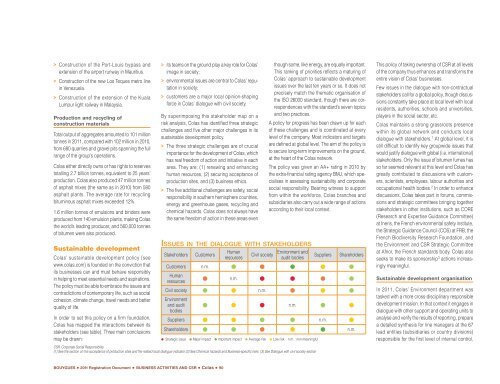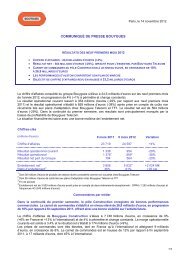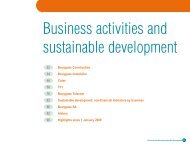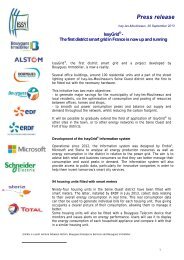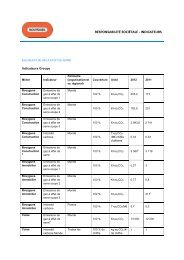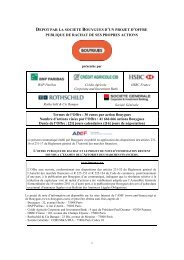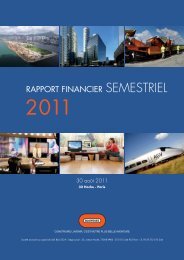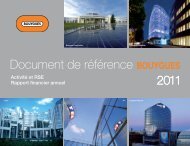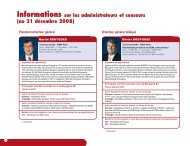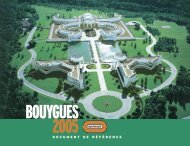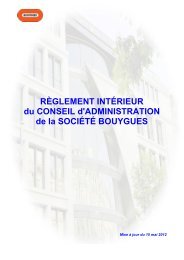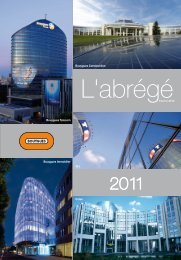Registration Document BOUYGUES
Registration Document BOUYGUES
Registration Document BOUYGUES
You also want an ePaper? Increase the reach of your titles
YUMPU automatically turns print PDFs into web optimized ePapers that Google loves.
Construction of the Port-Louis bypass and<br />
extension of the airport runway in Mauritius.<br />
> Construction of the new Los Teques metro line<br />
in Venezuela.<br />
> Construction of the extension of the Kuala<br />
Lumpur light railway in Malaysia.<br />
Production and recycling of<br />
construction materials<br />
Total output of aggregates amounted to 101 million<br />
tonnes in 2011, compared with 102 million in 2010,<br />
from 680 quarries and gravel pits spanning the full<br />
range of the group’s operations.<br />
Colas either directly owns or has rights to reserves<br />
totalling 2.7 billion tonnes, equivalent to 25 years’<br />
production. Colas also produced 47 million tonnes<br />
of asphalt mixes (the same as in 2010) from 580<br />
asphalt plants. The average rate for recycling<br />
bituminous asphalt mixes exceeded 12%.<br />
1.6 million tonnes of emulsions and binders were<br />
produced from 140 emulsion plants, making Colas<br />
the world’s leading producer, and 560,000 tonnes<br />
of bitumen were also produced.<br />
Sustainable development<br />
Colas’ sustainable development policy (see<br />
www.colas.com) is founded on the conviction that<br />
its businesses can and must behave responsibly<br />
in helping to meet essential needs and aspirations.<br />
The policy must be able to embrace the issues and<br />
contradictions of contemporary life, such as social<br />
cohesion, climate change, travel needs and better<br />
quality of life.<br />
In order to set this policy on a firm foundation,<br />
Colas has mapped the interactions between its<br />
stakeholders (see table). Three main conclusions<br />
may be drawn:<br />
> its teams on the ground play a key role for Colas’<br />
image in society;<br />
> environmental issues are central to Colas’ reputation<br />
in society;<br />
> customers are a major local opinion-shaping<br />
force in Colas’ dialogue with civil society.<br />
By superimposing this stakeholder map on a<br />
risk analysis, Colas has identified three strategic<br />
challenges and five other major challenges in its<br />
sustainable development policy.<br />
> The three strategic challenges are of crucial<br />
importance for the development of Colas, which<br />
has real freedom of action and initiative in each<br />
area. They are: (1) renewing and enhancing<br />
human resources, (2) securing acceptance of<br />
production sites, and (3) business ethics.<br />
> The five additional challenges are safety, social<br />
responsibility in southern hemisphere countries,<br />
energy and greenhouse gases, recycling and<br />
chemical hazards. Colas does not always have<br />
the same freedom of action in these areas even<br />
Issues in the dialogue with stakeholders<br />
Stakeholders<br />
Customers<br />
Human<br />
resources<br />
Civil society<br />
though some, like energy, are equally important.<br />
This ranking of priorities reflects a maturing of<br />
Colas’ approach to sustainable development<br />
issues over the last ten years or so. It does not<br />
precisely match the thematic organisation of<br />
the ISO 26000 standard, though there are correspondences<br />
with the standard’s seven topics<br />
and two practices.<br />
A policy for progress has been drawn up for each<br />
of these challenges and is coordinated at every<br />
level of the company. Most indicators and targets<br />
are defined at global level. The aim of the policy is<br />
to secure long-term improvements on the ground,<br />
at the heart of the Colas network.<br />
The policy was given an AA+ rating in 2010 by<br />
the extra-financial rating agency BMJ, which specialises<br />
in assessing sustainability and corporate<br />
social responsibility. Bearing witness to support<br />
from within the workforce, Colas branches and<br />
subsidiaries also carry out a wide range of actions<br />
according to their local context.<br />
Environment and<br />
audit bodies<br />
l Strategic issue l Major impact l Important impact l Average risk l Low risk n.m. : non-meaningful<br />
Suppliers<br />
Shareholders<br />
Customers n.m. l l l l l<br />
Human<br />
resources l n.m. l l l l<br />
Civil society l l n.m. l l l<br />
Environment<br />
and audit<br />
bodies<br />
l l l n.m. l l<br />
Suppliers l l l l n.m. l<br />
Shareholders l l l l l n.m.<br />
This policy of taking ownership of CSR at all levels<br />
of the company thus enhances and transforms the<br />
entire vision of Colas’ businesses.<br />
Few issues in the dialogue with non-contractual<br />
stakeholders call for a global policy, though discussions<br />
constantly take place at local level with local<br />
residents, authorities, schools and universities,<br />
players in the social sector, etc.<br />
Colas maintains a strong grassroots presence<br />
within its global network and conducts local<br />
dialogue with stakeholders. 1 At global level, it is<br />
still difficult to identify key groupwide issues that<br />
would justify dialogue with global (i.e. international)<br />
stakeholders. Only the issue of bitumen fumes has<br />
so far seemed relevant at this level and Colas has<br />
greatly contributed to discussions with customers,<br />
scientists, employees, labour authorities and<br />
occupational health bodies. 2 In order to enhance<br />
discussions, Colas takes part in forums, commissions<br />
and strategic committees bringing together<br />
stakeholders in other institutions, such as CORE<br />
(Research and Expertise Guidance Committee)<br />
at Ineris, the French environmental safety institute,<br />
the Strategic Guidance Council (COS) at FRB, the<br />
French Biodiversity Research Foundation, and<br />
the Environment and CSR Strategic Committee<br />
at Afnor, the French standards body. Colas also<br />
seeks to make its sponsorship 3 actions increasingly<br />
meaningful.<br />
Sustainable development organisation<br />
In 2011, Colas’ Environment department was<br />
tasked with a more cross-disciplinary responsible<br />
development mission. In that context it engages in<br />
dialogue with other support and operating units to<br />
analyse and verify the results of reporting, prepare<br />
a detailed synthesis for line managers at the 67<br />
lead entities (subsidiaries or country divisions)<br />
responsible for the first level of internal control,<br />
CSR: Corporate Social Responsibility<br />
(1) See the section on the acceptance of production sites and the related local dialogue indicator (2) See Chemical hazards and Business-specific risks (3) See Dialogue with civil society section<br />
<strong>BOUYGUES</strong> • 2011 <strong>Registration</strong> <strong>Document</strong> • BUSINESS ACTIVITIES AND CSR • Colas • 90


